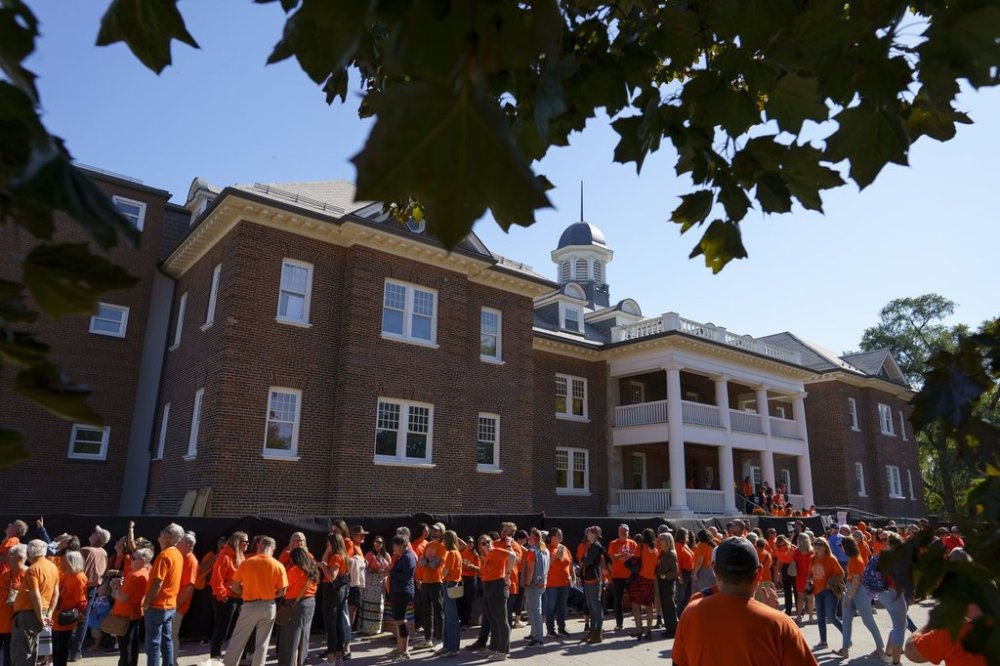Science
Indigenous Leaders Challenge Public Figures on Residential School Denial

As Indigenous Peoples observed the National Day for Truth and Reconciliation on September 30, they faced a troubling challenge: public figures questioning the authenticity of the history surrounding residential schools in Canada. These statements, which many Indigenous leaders argue undermine reconciliation efforts, come at a sensitive time for communities still grappling with the painful legacy of these institutions.
The Truth and Reconciliation Commission (TRC), established following a legal settlement between the federal government and survivors, determined that the primary objective of residential schools was to eliminate Indigenous cultures. Between 1857 and 1996, approximately 150,000 Indigenous children were forcibly removed from their families to attend church-run, government-funded schools. Within these institutions, children were prohibited from speaking their native languages, and many experienced severe abuse. It is estimated that around 6,000 children died while attending these schools, although experts from the National Centre for Truth and Reconciliation believe the actual number may be significantly higher.
The federal government recognized September 30 as the National Day for Truth and Reconciliation in 2021, following revelations from the Tk̓emlúps te Secwépemc First Nation. Ground-penetrating radar surveys at a former residential school site in Kamloops, British Columbia, uncovered approximately 200 potential unmarked graves, drawing significant attention to the harrowing legacy of these institutions.
Leading up to this year’s observance, several prominent figures made statements that downplayed or denied the realities faced by residential school survivors. For example, former British Columbia Conservative Member of the Legislative Assembly Dallas Brodie shared a trailer for a controversial video titled “Making a Killing: Reconciliation, Genocide and Plunder in Canada.” Brodie had previously faced expulsion from the Conservative Party for making comments that mocked survivors’ testimonies, including those related to child sexual abuse.
In another incident, a staff member for the Conservative Party of British Columbia was terminated after calling the Survivors’ flag, which honors those affected by residential schools, a “disgrace” and a “fake” representation of Canadian history. Additionally, Maxime Bernier, leader of the People’s Party of Canada, took to social media to dismiss claims of genocide and to assert that reconciliation should involve rejecting what he termed “victim mentality” and “fake white guilt.”
In response to these statements, Mandy Gull-Masty, Indigenous Services Minister, condemned Bernier’s remarks, declaring them disrespectful and lacking humility. She emphasized that such comments do not reflect the honesty expected from those who claim to represent Canadians. The Assembly of First Nations has referred Bernier’s comments as potential hate speech to the Royal Canadian Mounted Police (RCMP).
The Assembly stated, “The truth is that First Nations have been experiencing hate speech—and much more discrimination—since this country was created.” Following this, Bernier claimed that the Assembly’s National Chief, Cindy Woodhouse Nepinak, was more interested in financial gains than in truth and reconciliation.
Historian Sean Carleton characterized the denial of residential school history as a tactic aimed at eroding public trust in survivors’ narratives and the reconciliation process. He highlighted the dangers of spreading doubt about established truths, stating, “It’s a constant sowing of seeds of doubt in things that we don’t need to be doubtful about.”
In an effort to combat this denialism, NDP Member of Parliament Leah Gazan previously introduced a private member’s bill aimed at criminalizing the downplaying of residential school abuses. Although the bill did not progress due to the dissolution of Parliament before the spring election, Gazan continues to advocate for its revival, emphasizing the harm caused to survivors by ongoing denialist rhetoric. “If we can’t keep survivors safe, we’ve got a problem,” she remarked, underscoring the importance of honoring the stories of those who endured suffering in these institutions.
Former Minister of Crown-Indigenous Relations Marc Miller reflected on how the events of 2021 marked a pivotal moment for many Canadians in understanding the history of residential schools. He noted a tendency among some to focus on inaccuracies in reports to claim that no harm occurred within these institutions. “Atrocities did occur, and they occurred in much the way people have described them. It’s a painful realization for a country like Canada to come to,” Miller stated.
He shared poignant accounts from survivors, including a woman who requested to sit on his right side due to trauma inflicted by her teacher. Another survivor expressed his love for playing the drum, as it provided a brief escape from the abuse he faced. “These are not fictitious events,” Miller emphasized, stating that denialism invalidates the lived experiences of those who suffered.
As Indigenous Peoples continue to advocate for recognition and reconciliation, the recent statements from public figures serve as a stark reminder of the ongoing challenges they face. The commitment to truth is essential for healing and building a more equitable future in Canada.
-

 Science3 months ago
Science3 months agoToyoake City Proposes Daily Two-Hour Smartphone Use Limit
-

 Top Stories3 months ago
Top Stories3 months agoPedestrian Fatally Injured in Esquimalt Collision on August 14
-

 Health3 months ago
Health3 months agoB.C. Review Reveals Urgent Need for Rare-Disease Drug Reforms
-

 Technology3 months ago
Technology3 months agoDark Adventure Game “Bye Sweet Carole” Set for October Release
-

 World3 months ago
World3 months agoJimmy Lai’s Defense Challenges Charges Under National Security Law
-

 Lifestyle3 months ago
Lifestyle3 months agoVictoria’s Pop-Up Shop Shines Light on B.C.’s Wolf Cull
-

 Technology3 months ago
Technology3 months agoKonami Revives Iconic Metal Gear Solid Delta Ahead of Release
-

 Technology3 months ago
Technology3 months agoApple Expands Self-Service Repair Program to Canada
-

 Technology3 months ago
Technology3 months agoSnapmaker U1 Color 3D Printer Redefines Speed and Sustainability
-

 Technology3 months ago
Technology3 months agoAION Folding Knife: Redefining EDC Design with Premium Materials
-

 Business3 months ago
Business3 months agoGordon Murray Automotive Unveils S1 LM and Le Mans GTR at Monterey
-

 Technology3 months ago
Technology3 months agoSolve Today’s Wordle Challenge: Hints and Answer for August 19









